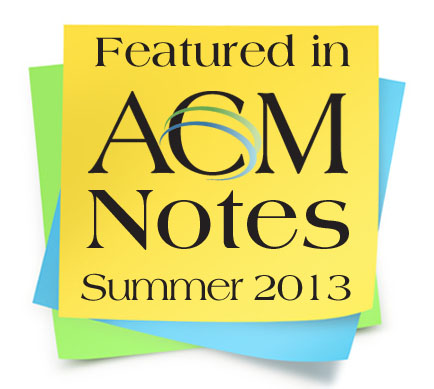“The best experience I had was just trying to get out into the community and trying to get involved,” said Taylor Shelton from Monmouth College, recalling her semester on the ACM Chicago Program in spring 2012.
For one of Shelton’s classmates, Sam Sekulich from Lake Forest College, the program’s fascinating speakers and field trips were continual highlights. “It was every day, every moment, you just tried to learn something from everything that you did,” she said.
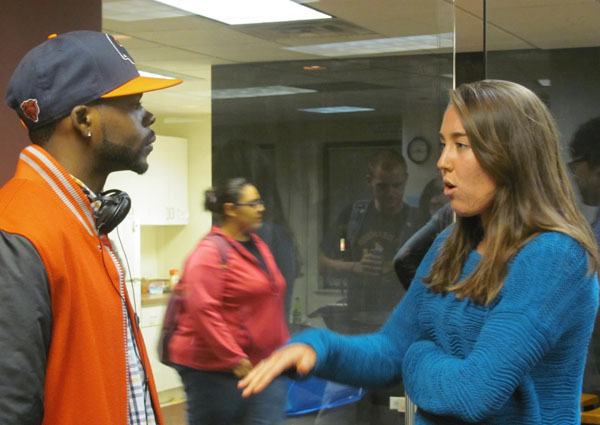 Shea Love talking with award-winning spoken word artist Lamar Jorden. (Photo courtesy of Dorothy Burge)
Shea Love talking with award-winning spoken word artist Lamar Jorden. (Photo courtesy of Dorothy Burge)
Talking to people and hearing their stories – whether it was panhandlers asking for spare change or young people finding their voices through poetry – was central to the experience of Shea Love, a Lawrence University student who participated on the program last fall.
Raising awareness, learning from many different people, and pursuing their interests and passions – all are themes that run throughout the stories these three program alumni tell about their off-campus study in Chicago.
On a new path to activism
As with so many students on the Chicago Program, a suggestion from faculty member Dorothy Burge sent Shelton in a direction that helped raise her awareness and set her on a new path toward activism.
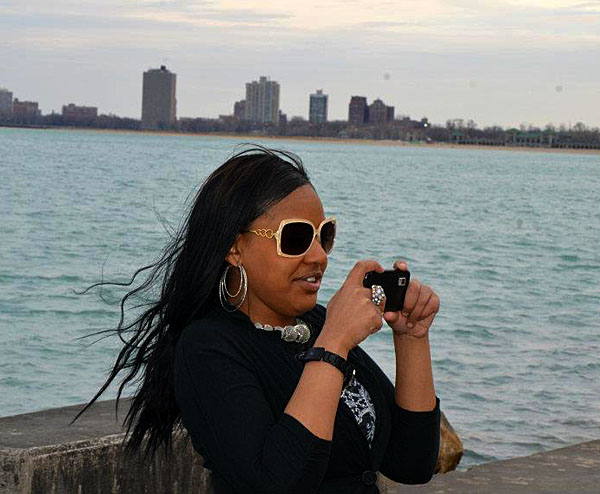 Taylor Shelton along Chicago’s lakefront. (Photo courtesy of Taylor Shelton)
Taylor Shelton along Chicago’s lakefront. (Photo courtesy of Taylor Shelton)
“She got me involved in a community organization that was fighting for justice for Rekia Boyd,” said Shelton. The 22-year-old Boyd was an innocent bystander who had been shot and killed by an off-duty Chicago police officer in March 2012. The shooting had recently occurred, but there had been very little publicity in the media.
“That [case] opened my mind as to what I want to do in life, but that I didn’t really think about before I had that experience – going into human rights activism,” Shelton said. “It inspired me to want to get out into urban communities and fight for justice.”
She attended community meetings, got to know Boyd’s family, went to press conferences, and created a website about the Boyd case for her independent study project.
Her desire to become active continued throughout the semester, Shelton said. On her internship at the Children and Family Justice Center of the Northwestern University School of Law, she was assigned to gather information about cases in which children had been given sentences of life without parole.
| See videos of Taylor Shelton, Sam Sekulich, and Shea Love giving presentations about their experiences on the Chicago Program at the 2013 Student Symposium on Off-Campus Study. |
“I had been [to Chicago] to shop and sightsee,” said Shelton, who is from western Illinois, “but I never really got to see deep down into the neighborhoods and experience how people lived.” The internship, though, had her going out into all parts of the city and the suburbs to interview people. This was not out of a textbook. It was hearing people’s firsthand accounts about how the criminal justice system affected their lives.
“Immersing yourself into the community is the best thing that you can do while you’re in the Chicago Program,” Shelton said. “The only way that we can make change is to go out there and change it ourselves.”
Combining academic interests
“I could talk endlessly about the faculty on the Chicago Program,” said Sam Sekulich from Lake Forest College. “They all had something different to bring, and they all have connections.”
The connections were obvious in the places the students visited and the people they met. One of Sekulich’s favorite sessions was with actress Kristina Vlada-Viars, who talked with the students in the arts seminar about her life as a working artist in New York and Chicago. Another was a Core Course discussion with City Council member Joe Moore and journalist Ben Joravsky, two long-time observers of the Chicago political scene.
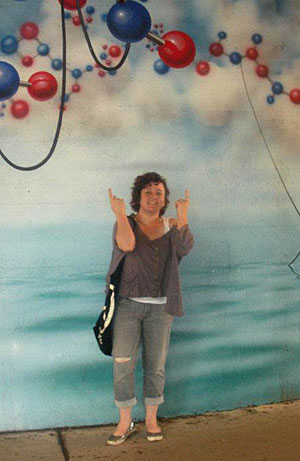 Sam Sekulich in front of a mural in the Rogers Park neighborhood. (Photo courtesy of Sam Sekulich)
Sam Sekulich in front of a mural in the Rogers Park neighborhood. (Photo courtesy of Sam Sekulich)
“Right at the beginning of the semester, it was not even two or three weeks in, [Moore and Joravsky] gave us this really cool, big picture perspective about what was going on in the city,” she noted. “All the issues that they talked about were so relevant.”
A double major in psychology and theater, Sekulich was able to combine both of her academic interests on the Chicago Program’s arts track. Her internship was with Erasing the Distance, a nonprofit organization that produces monologues and scenes based on people’s personal stories about the impact of mental health issues on their lives.
When she saw some of the city’s mental health clinics being closed, including one in the neighborhood where she lived, Sekulich said she was inspired to address the issue through her independent project. She gathered video clips from a wide range of sources and edited them into a video piece presenting her thoughts about the relationship between mental health and art.
“Even though I was there to study art,” she said, “I figured I could still include my passion for mental health education within my art project.”
Real people dealing with real issues
“We got the stories from the people,” said Shea Love. “It wasn’t just a news story or something that we read about that happened in Chicago. We heard it from real people who were dealing with real issues. That was very powerful.”
For her independent study project (ISP) on homelessness, Love talked with panhandlers in downtown Chicago and people such as Jim LoBianco, the executive director of StreetWise, a magazine that raises awareness about the impact of poverty and homelessness in Chicago. She created a ‘zine – titled Word on the Street Is… – in which she collected her thoughts and poems based on the stories of the homeless people she met.
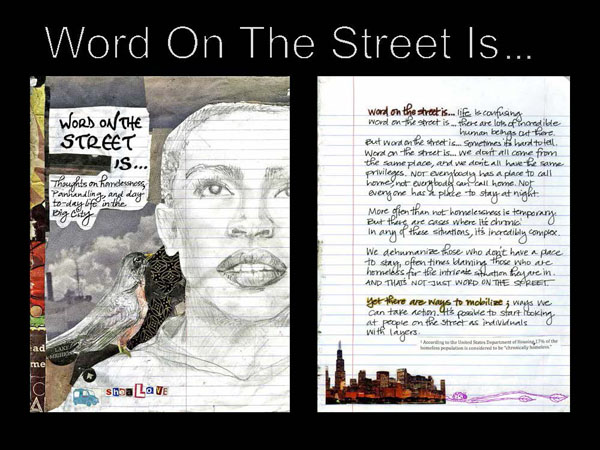 The cover and a page from Shea Love’s ‘zine.
The cover and a page from Shea Love’s ‘zine.
“There was a beautiful overlap in my internship and my ISP,” Love said. “I really started developing my spoken word and slam poetry when I was in Chicago, because I worked for Young Chicago Authors.”
Love had heard from friends about Young Chicago Authors (YCA), an organization that offers poetry workshops for middle school and high school students and sponsors the well-known Louder than a Bomb poetry festival. “The organization is an outlet for youth,” Love said, “and [a place] for them to really have a voice and know that other people are listening to them.”
It was, she said, her “dream internship.” As programs coordinator, Love worked with students from throughout Chicago, helping recruit participants and facilitate YCA’s workshops and open mic nights. It was a great opportunity for her, both to learn a lot about how to organize programming and to get to know so many students and talented poets at YCA.
“[The Chicago Program] was one of the best experiences I’ve had, academically and in other ways,” Love said. “I wish it could have been a year-long program!”
Links:
- Chicago Program: Arts, Entrepreneurship, & Urban Studies
- 2013 Student Symposium on Off-Campus Study and videos of presentations by Taylor Shelton, Sam Sekulich, and Shea Love






